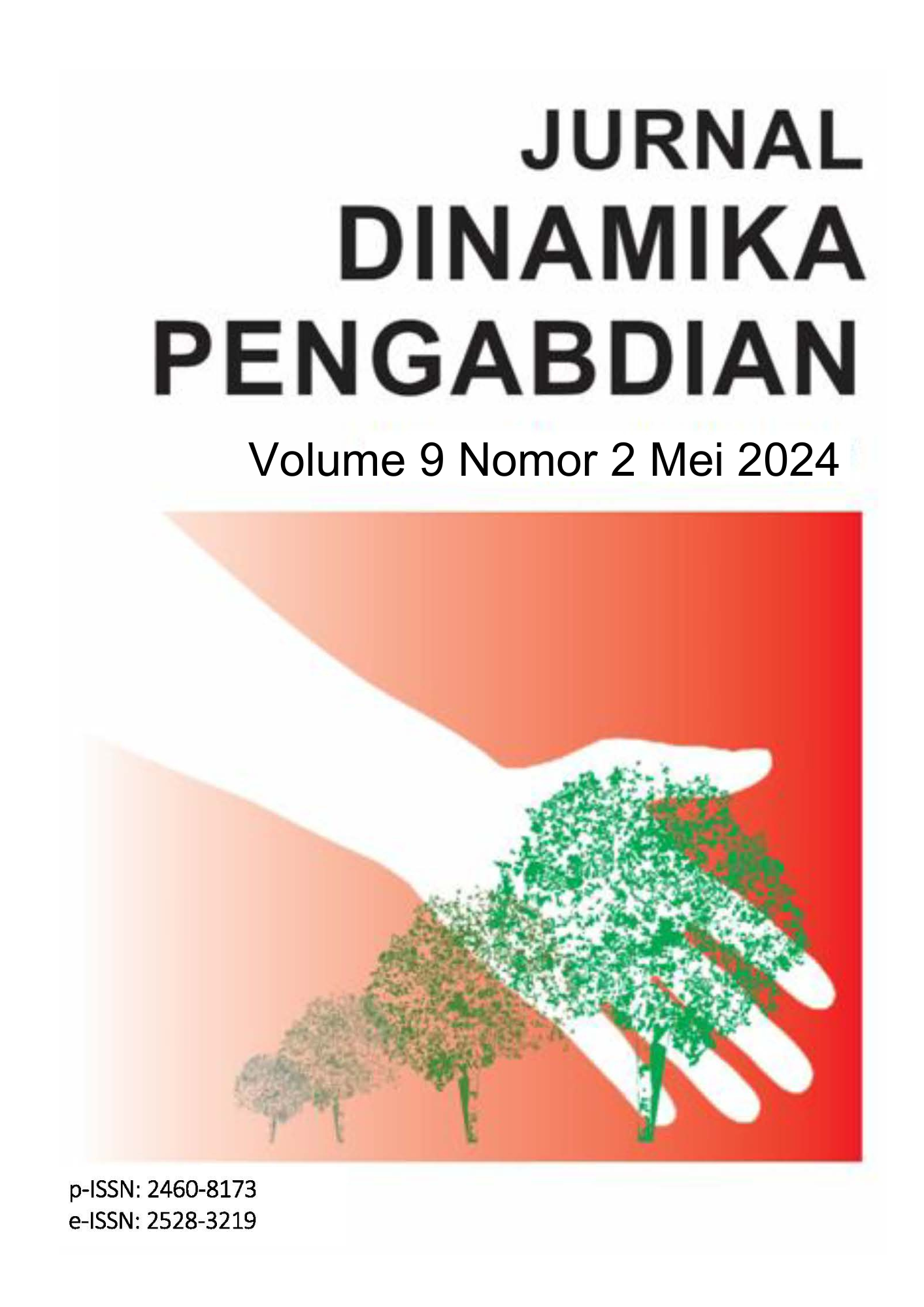PEMANFAATAN BAHAN ALAMI BIOAKTIF TANAMAN (BABT) SEBAGAI BAHAN PESTISIDA NABATI DI KECAMATAN PATTALASSANG KABUPATEN GOWA
DOI:
https://doi.org/10.20956/jdp.v9i1.31421Keywords:
Pestisida nabati, BABT, Sayuran organikAbstract
Kabupaten Gowa merupakan salah satu daerah sentra tanaman sayuran yang terletak di sebelah selatan Provinsi Sulawesi Selatan. Sayuran merupakan salah satu tanaman hortikultura yang banyak dibudidayakan tetapi pengelolaan tanaman sayuran bersifat konvensional dengan asupan senyawa kimia sintetik yang tinggi terrmasuk pupuk dan pestisida sintetik. Pengunaan bahan kimia sintetik yang tinggi dalam pengelolaan tanaman sayuran akan membahayakan kesehatan konsumen dan tidak ramah lingkungan. Keprihatinan terhadap isu lingkungan dan preferensi konsumen yang tinggi terhadap produk sayur organik maka Fresko Organik yang berlokasi di Desa Pacellekang Kecamatan Pattalassang Kabupaten Gowa telah melakukan budidaya sayuran secara organik tetapi masih banyak kendala yang dihadapi sedangkan pada kelompok masyarakat (KWT ASYTA) adalah yang ada di lokasi tersebut juga tidak berkembang/produktif karena tidak mendapat pendampingan/bimbingan terutama bagaimana sistem budidaya sayuran yang ramah lingkungan semuanya masih mengandalkan penggunaan senyawa kimia sintetik. Dari hasil pengamatan dilapang dan wawancara/diskusi, maka permasalahan yang ditemukan adalah kurangnya pemahaman dan teknologi bagaimana memanfaatkan potensi sumber daya lokal yang ada misalnya pemanfaatan teknologi BABT terutama untuk pembuatan pupuk organik dan untuk pengendalian/pengelolaan hama dan penyakit tanaman. Solusi yang ditawarkan adalah dengan melakukan pelatihan pembuatan pestisida dan pupuk organik yang berasal dari bahan alami bioaktif tanaman dan implementasi penggunaan BABT pada lahan Fresko organik sebagai tempat pembelajaran terhadap dampak penggunaan BABT dalam upaya mengurangi serangan hama. Pemanfaatan BABT mulai dari pengenalan jenis jenis BABT yang bisa dimanfaatkan sebagai pengendali hama dan pupuk organik kompos. Metode yang diterapkan adalah: penyuluhan, pelatihan, demonstrasi teknologi, aplikasi teknologi serta pendampingan yang dilakukan secara partisipatif.
Kata kunci: Pestisida nabati, BABT, sayur organik.
ABSTRACT
Gowa Regency is one of the vegetable growing centers among the 23 regencies and municipalities in South Sulawesi Province and is located in the south of the province. Vegetables are one of the most widely cultivated horticultural crops, but the management of vegetable crops is conventional, with a high intake of synthetic chemical compounds, including synthetic fertilizers and pesticides. The high use of synthetic chemicals in the management of vegetable crops will endanger the health of consumers and is not environmentally friendly. Concerned about environmental issues and high consumer preferences for organic vegetable products, the organic frescoes are located in Pattalassang sub-district, Pacellekang village, and Pacellekang district. Gowa has been cultivating vegetables organically, but there are still many obstacles to face. The community group (KWT ASYTA) says that those in that location are also not developing or productive because they don't get assistance or guidance, especially since an environmentally friendly vegetable cultivation system still relies on the use of synthetic chemical compounds. From the results of field observations and interviews and discussions, the problems found are lack of understanding and technology on how to take advantage of the potential of existing local resources, for example, the use of BABT technology, especially for the manufacture of organic fertilizers and for the control and management of pests and plant diseases. The solutions offered are conducting training on making organic pesticides and fertilizers derived from natural bioactive plant ingredients and Implementation of the use of BABT on organic Fersko land as a place to learn about the impact of using BABT in an effort to reduce pest attacks. The utilization of BABT, starting with the introduction of the types of BABT that can be used as pest control and organic compost fertilizer. The methods applied are counseling, training, technology demonstration, technology application, and mentoring, which is carried out in a participatory manner.
Keywords: Botanical pesticides, BABT, organic vegetables.
References
Aprialty, A. S., Sjam, S., Dewi, V. S., & Agustina, Y. E. (2021). The synergy of Calotropis gigantea and Cresscentia cujete plant extracts as an inhibitor of egg hatching and antifeedant against Spodoptera frugiperda. IOP Conference Series: Earth and Environmental Science, 807(2). https://doi.org/10.1088/1755-1315/807/2/022086
Costa, C. A., Guiné, R. P. F., Costa, D. V. T. A., Correia, H. E., & Nave, A. (2018). Pest control in organic farming. In Organic Farming: Global Perspectives and Methods (pp. 41–90). Elsevier. https://doi.org/10.1016/B978-0-12-813272-2.00003-3
Divekar, P. A., Narayana, S., Divekar, B. A., Kumar, R., Gadratagi, B. G., Ray, A., Singh, A. K., Rani, V., Singh, V., Singh, A. K., Kumar, A., Singh, R. P., Meena, R. S., & Behera, T. K. (2022). Plant Secondary Metabolites as Defense Tools against Herbivores for Sustainable Crop Protection. In International Journal of Molecular Sciences (Vol. 23, Issue 5). MDPI. https://doi.org/10.3390/ijms23052690
Gajger, I. T., & Dar, S. A. (2021). Plant Allelochemicals as Sources of Insecticides. https://doi.org/10.3390/insects
Imran, A., Sardar, F., Khaliq, Z., Nawaz, M. S., Shehzad, A., Ahmad, M., Yasmin, S., Hakim, S., Mirza, B. S., Mubeen, F., & Mirza, M. S. (2022). Tailored Bioactive Compost from Agri-Waste Improves the Growth and Yield of Chili Pepper and Tomato. Frontiers in Bioengineering and Biotechnology, 9. https://doi.org/10.3389/fbioe.2021.787764
Lengai, G. M. W., Muthomi, J. W., & Mbega, E. R. (2020a). Phytochemical activity and role of botanical pesticides in pest management for sustainable agricultural crop production. Scientific African, 7, e00239. https://doi.org/https://doi.org/10.1016/j.sciaf.2019.e00239
Lengai, G. M. W., Muthomi, J. W., & Mbega, E. R. (2020b). Phytochemical activity and role of botanical pesticides in pest management for sustainable agricultural crop production. In Scientific African (Vol. 7). Elsevier B.V. https://doi.org/10.1016/j.sciaf.2019.e00239
Sjam, S. (2011). Review Article: Teknologi Pengendalian Hama dalam Sistem Budidaya Sayuran Organik (Pest Control Technology in Organic Vegetable Cultivation System) Combination of compost and Trichoderma for soil amendment View project. https://www.researchgate.net/publication/304539946
Downloads
Published
How to Cite
Issue
Section
License
Copyright (c) 2023 Jurnal Dinamika Pengabdian (JDP)

This work is licensed under a Creative Commons Attribution 4.0 International License.
Penulis diwajibkan untuk menandatangani "Surat Perjanjian Hak Cipta" atau Copyright Agreement untuk penyerahan ijin kepada pihak jurnal untuk menerbitkan tulisannya.
Authors are required to sign a "Copyright Agreement" to submit permission to the journal to publish their writings.






